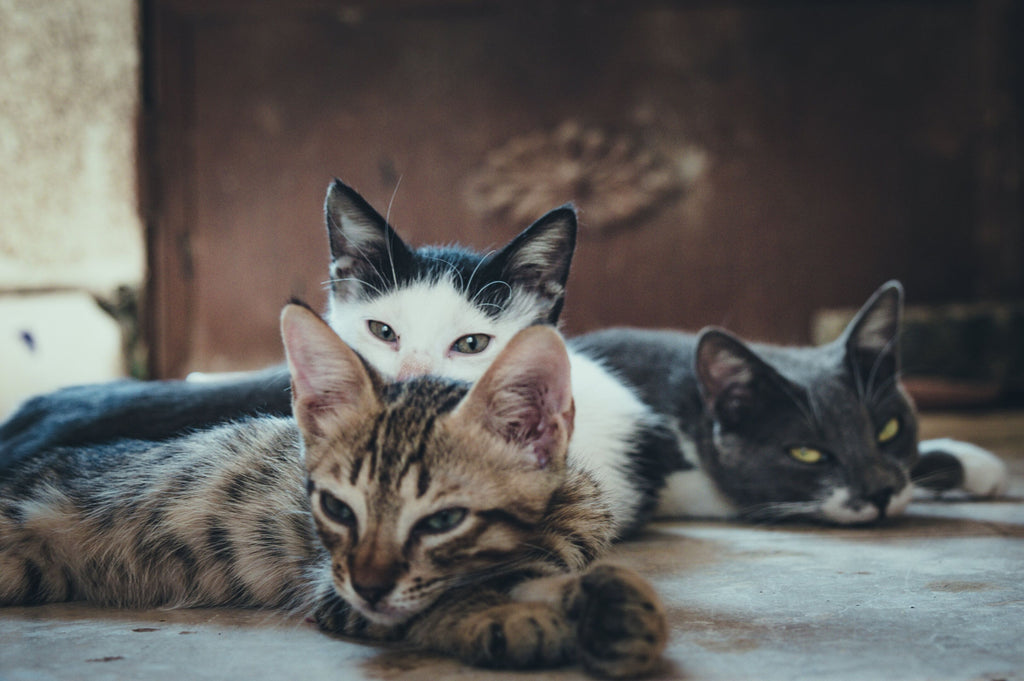Does Your Cat Have Worms? Here's How To GET RID OF THEM! 2023
If you're anything like most cat parents, chances are you've already spotted worms in your pet's litter box. It's also possible that you've already experienced treating a worm infestation at least once, too.
And yes, your cat can contract worms and carry worms at any time if you're not careful.
But even if you still haven't had the chance of dealing with infected feces or administering worm treatment, this doesn't mean that your kitty cat has never been infected by small intestinal parasites.
Surprisingly, a feline can have worms even if you don't see them in its stools. Worms in cats are very common and it is reported that 45% of cats have had worms at some point in their lives.
We've put together this blog post to get you in on the important things you need to know about the most common intestinal parasites that infect cats.
Moreover, we're also going to tackle a cat's symptoms during worm infestations as well as the strategies you can go for when it comes to getting rid of these unwanted visitors.
How about we start things off by having an overview of the usual suspects as regards cat worms?
Types of Intestinal Worms a Cat Can Catch

Infected cats can carry various types of worm eggs. While you may observe common clinical signs when you treat worms in cats, chances are it's not going to be the same unwanted visitors every time.
Contaminated feces (or cat's poop) are often the sources of infected eggs. It is crucial to remember that these infected feces may come from both outdoor cats and indoor cats. Infected feces from other pets can also be a source of an intestinal parasite or two.
Infected soil can also be a potential source of tapeworm eggs, roundworm eggs, whipworm eggs, as well as worm larvae that can infiltrate a cat's intestines and may even cause severe infestations if no proper care and attention are given.
Surprisingly, an infected cat can also possibly transmit worm eggs and other parasites through the mother's milk. This is why cat owners should know how to prevent worms in both young and adult cats since overlooking the same can lead to disaster sooner or later.
Various Types of Intestinal Worms Infect Cats

Roundworms in cats
When your cat has worms, there's a possibility it's a roundworm infection. A mother can infect her kittens either during pregnancy or while breastfeeding. Cats can also catch these worms directly through the ingestion of eggs, but also indirectly through the ingestion of infected rodent tissue.
These worms look like very tiny pieces of spaghetti. They feed on whatever is available in your cat's intestines and an infected animal can lose a lot of vital nutrients in the process. Symptoms of roundworms in cats often include diarrhea with mucus, unexpected weight loss, and a swollen abdomen.
Tapeworms in cats
The tapeworm—also known as the flatworm—is another common intestinal worm that indoor cats and outdoor cats can be susceptible to. This worm breaks into small segments and can have the appearance of grains of rice or sesame seeds in your cat's anus or cat's poop.
This type of worm is primarily transmitted through an intermediate host, often a rodent, by ingesting eggs that are infected from contaminated soil, much like liver flukes. Tapeworm segments can also be a cause of infection.
A cat affected by fleas is just at risk because it can potentially ingest whole worms when grooming itself. Most cats are often prescribed with multiple doses of deworming medication in this case.
Symptoms of tapeworms are often subtle. Cats can even sometimes be asymptomatic. However, severe cases can even lead to life-threatening situations if proper care and attention are not provided. Interestingly, tapeworm treatment can be done through natural means.
Hookworms in cats
As their name suggests, these worms have small hooks that allow them to cling to the wall of the intestines and then feed on blood. Cats affected by hookworms (tapeworms, too) can therefore develop severe anemia.
These parasites are transmitted through the fecal-oral route. In addition, as disturbing as it may seem, their larvae can migrate through the skin. They are rather difficult to notice in cat stools since they are only half an inch in size. Common signs of hookworms include diarrhea, blood in the stool, weight loss, and weakness.
Whipworms
There are also whipworms, but they are more common in dogs. These cat worms may be a bit a bit uncommon in felines, but they can still infect your pet. They can infiltrate the intestinal wall and damage affected tissues. Whipworms can be some of the worms found in contaminated litter boxes.
The bottom line
With that said, you might be thinking, "Are worms painful for my feline?" The answer is yes.
Moreover, these unwanted visitors can also set off other health issues that can be serious. This is why you should make it a point to prevent infection or provide the right treatment and support when your cat has worms.
Is It Possible for My Cat to Catch Adult Worms (and Parasite Eggs) If It Just Stays Inside?

You might probably think that your cat will catch worms if it just stays inside your home. This is why we advise you to keep cats inside your home to them safe (and at the same time, save the neighborhood birds).
You may wonder "How did my indoor cat get worms?" It only takes a little mouse that sneaks into your house, the visiting dog that brings in fleas, or your tomcat that runs away and then returns, for your cat to become at risk.
What are the Symptoms of Worms in Cats?

No matter what type of worms your cat has, the symptoms are generally quite similar. Let's walk through the common signs of worm infestation for this part of our discussion.
How to tell if your cat has worms:
Cats with worms typically have a coarse coat, will experience diarrhea, have little or no appetite, and may even vomit. In short, during a major parasitosis, they will not be doing very well.
Here is a more complete list of signs that a cat might exhibit in cases of a worm infestation:
-
Blood in stool
-
Loss of appetite
-
Vomiting
-
Weight loss
-
Elimination of worms in the stool
-
Feces covered with mucus
-
Weakness
-
Appearance of what looks like rice grains around the anus
-
Evidence of worms at the opening of the anus
-
Swollen abdomen
These signs are generally present during a significant parasitosis. Most animals show little or no symptoms during a minor to moderate infestation. A fecal exam may also be conducted to come up with a reasonable diagnosis.
Conventional Worming Treatment Options

Now do you want to know how to get rid of your cat's worms? Different strategies are available to you.
We recommend that you first visit a vet so that they can make a diagnosis and, after analyzing your kitty’s stools, determine what type of worms are multiplying in your cat's digestive system.
Depending on the amount of worms that your cat is dealing with, the vet will recommend the best dewormer, adapted to the cat’s needs.
Dewormers prescribed by the veterinarian
Dewormers (or wormers) are given either in tablet or liquid form and are very effective and safe.
It’s normal to see worms in your cat's stool for a short period after giving the product, as the body purges and eliminates them in the stool.
The larvae of certain types of worms can, however, become embedded in the body's tissues, making it impossible to get rid of them immediately. They can remain dormant for some time and multiply later.
This is why the treatment of worms usually requires several doses, to avoid recurrences.
Over-the-counter dewormer treatments
Most over-the-counter products are just as effective, but for the most part, they fight a more limited spectrum of intestinal worms.
Natural Worming Treatments for Cats

Many cat parents look for home remedies and natural ways to get rid of worms in cats. However, make sure you consult with a pet homeopathy expert or your vet first before using natural treatments for intestinal worms.
Dewormers are essential for treating a parasitized cat. Nature is amazing and there are many simple remedies there. Below are some homemade dewormers to get rid of worms in cats: coconut oil, apple cider vinegar, and diatomaceous earth.
Coconut oil
Coconut oil is a good home remedy to get rid of intestinal worms. However, you should only provide your cat with only a single teaspoon of the same to prevent stomach upsets.
Apple cider vinegar
While further studies are still needed, apple cider vinegar is deemed a natural dewormer for cats. On the other hand, it can cause nausea and similar side effects if given too much. Half a teaspoon should do the trick.
Diatomaceous earth
Externally, it can help with issues involving fleas. When used internally, it can help get rid of worms in cats. It is safe to use, but it is always a good idea to educate yourself about the appropriate amounts and frequency for your pet. Be careful to choose a food-grade diatomaceous earth.
Homeopathic Product for Cats
If you're looking for a safe and natural option when dealing with worms in cats, we here at Zumalka highly recommend our PARASITES AND WORMS. It is designed to support your cat's immune response and digestive health to properly and completely expel the parasites.
A quick reminder, though. PARASITES AND WORMS should only be administered if worms or parasites are present. It is not to be used for prevention.
Can Cats Die from Worms?

This is indeed possible, especially if you have a kitten at home. They are more vulnerable to worm infestations because their immune systems are not yet fully developed.
A cat that has diarrhea for too long may suffer from severe dehydration. In addition, you now know that certain worms can cause anemia, a condition that can lead to death if left untreated.
In short, all the symptoms mentioned above must be addressed quickly to avoid a gloomy prognosis.
Can I Catch Worms from My Cat?
Several worms mentioned above are indeed contagious to humans. However, our immune system is often strong enough to purge them naturally.
That said, children and people who are immunocompromised are at higher risk of contracting it. I suggest that you wash your hands after cleaning your cat's litter box and clean it regularly to prevent contamination.
For pregnant women, it is important to wear gloves, or even let your spouse do the litter! Remember, your cat can have worms even if you don't see them! Also, cover your child's sandbox and wear gloves when gardening, as some stray cats may use them to do their business.
To conclude, many cats have had worms in their lifetime. It’s important to be alert to the various symptoms mentioned above, to prevent parasitosis in your kitty cat.
Although very disturbing, there are different remedies for these different types of intestinal worms. It’s important to act quickly to avoid contaminating yourself.
For us, the fear of catching worms is more than enough motivation to worm our animal companions!







Thanks for your great question, Sandra. Our remedies can be put in your cat’s water bowl, we don’t recommend mixing them with food. We sent you a private email to help you find the right product for your cat. We hope to hear back from you soon !
My feral cat will not let me pick her up. What can I,put in her food for worms? She drags her butt on the floor. Seems to not feel good but eats good.
Do worms die after your cat ejects them?
I have a older cat very sick. I have dewormer from the vet it’s a year old will it still do the job
Leave a comment